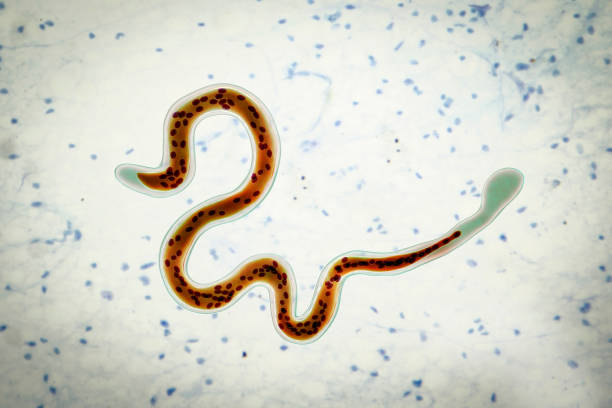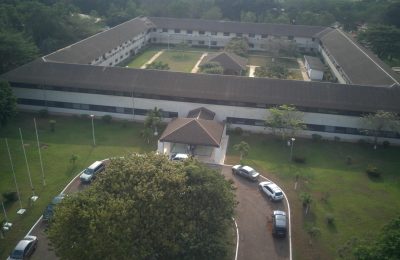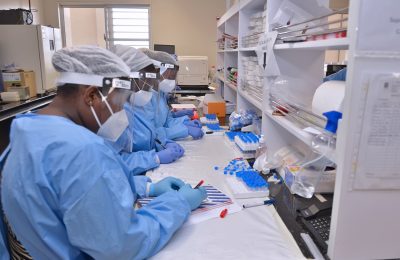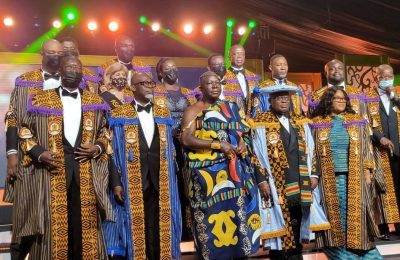- Home
- About
- Departments
- Research Activities
Advanced Research Center
Established in 2020
- Research Support Units
Co-ordinates All Activities Of The Institute
- Resources

Lymphatic Filariasis
Lead Investigator(s)
No data was found
Lymphatic Filariasis

Lead Investigator
Dr. Dziedzom K. de Souza
Project Summary
The Global Program to Eliminate Lymphatic Filariasis (GPELF) has seen significant achievements in the elimination of LF as a public health problem in the last two decades. The main strategy of the GPELF is the treatment of at least 65% of endemic communities for a minimum of 5 years to reduce infection to levels below transmission thresholds. A combination of albendazole with ivermectin and/or diethylcarbamazine is used, depending on co-endemicity with onchocerciasis and loa loa. Of 72 endemic countries, 11 (2 in Africa) have been validated for elimination as a public health problem, 10 stopped mass drug administration (MDA) and are under surveillance, 46 are implementing MDA and 5 are yet to start MDA. My research focusses on addressing the endgame challenges to LF elimination and supporting country Neglected Tropical diseases (NTD) programmes in evidence-based decision making.
- Molecular xenomonitoring (MX)
- Transmission assessment
- Monitoring and evaluation
- Evaluation of new diagnostics
- Design and implementation of novel surveillance strategies
My team has been involved in monitoring and evaluation activities of the LF programme in Ghana, utilizing new concepts and approaches to address the endgame challenges of the LF elimination programme. We have been instrumental in supporting the Ghana NTD programme in various research activities. These contributions, although mainly in Ghana, have provided insights into the implementation and operational research challenges, and can be extended to other African countries with similar challenges.
Through various studies, we have aimed to simplify the tools to enable an easier integration in LF control programmes. This body of work demonstrates the usefulness of MX in evaluating LF transmission in disease endemic countries. The collection of mosquitoes allows us to leverage a range of optimized, practical tools. Our work has been instrumental in critical programme decision making. The MX work in Togo, for example, contributed evidence to the dossier submitted for validation of the elimination of LF as a disease of public health. The potential for using mosquitoes to screen for blood-borne pathogens in animals and humans is being recognized by the global One Health community and we are making great progress in overcoming limitations and adapting the MX approach as a low-tech, adaptable surveillance platform.
•Strategies for the ENdgame: Targeting Infections among Non-compliants in the Elimination of Lymphatic filariasis (SENTINEL).
Project Background
The Global Program to Eliminate Lymphatic Filariasis (GPELF) has seen significant achievements in the elimination of LF as a public health problem in the last two decades. The main strategy of the GPELF is the treatment of at least 65% of endemic communities for a minimum of 5 years to reduce infection to levels below transmission thresholds. A combination of albendazole with ivermectin and/or diethylcarbamazine is used, depending on co-endemicity with onchocerciasis and loa loa. Of 72 endemic countries, 11 (2 in Africa) have been validated for elimination as a public health problem, 10 stopped mass drug administration (MDA) and are under surveillance, 46 are implementing MDA and 5 are yet to start MDA. My research focusses on addressing the endgame challenges to LF elimination and supporting country Neglected Tropical diseases (NTD) programmes in evidence-based decision making.
Objectives & Research Areas
- Molecular xenomonitoring (MX)
- Transmission assessment
- Monitoring and evaluation
- Evaluation of new diagnostics
- Design and implementation of novel surveillance strategies
Key Findings
My team has been involved in monitoring and evaluation activities of the LF programme in Ghana, utilizing new concepts and approaches to address the endgame challenges of the LF elimination programme. We have been instrumental in supporting the Ghana NTD programme in various research activities. These contributions, although mainly in Ghana, have provided insights into the implementation and operational research challenges, and can be extended to other African countries with similar challenges.
Through various studies, we have aimed to simplify the tools to enable an easier integration in LF control programmes. This body of work demonstrates the usefulness of MX in evaluating LF transmission in disease endemic countries. The collection of mosquitoes allows us to leverage a range of optimized, practical tools. Our work has been instrumental in critical programme decision making. The MX work in Togo, for example, contributed evidence to the dossier submitted for validation of the elimination of LF as a disease of public health. The potential for using mosquitoes to screen for blood-borne pathogens in animals and humans is being recognized by the global One Health community and we are making great progress in overcoming limitations and adapting the MX approach as a low-tech, adaptable surveillance platform.
Ongoing Activities
•Strategies for the ENdgame: Targeting Infections among Non-compliants in the Elimination of Lymphatic filariasis (SENTINEL).
Ahorlu CS, Okyere D, Pi-Bansa S, Otchere J, Marfo B, Asemanyi-Mensah K, Opare JL, Long EF, de Souza DK (2022). COVID-19 related perception among some community members and frontline healthcare providers for NTD control in Ghana. BMC Infectious Diseases 22:106. https://doi.org/10.1186/s12879-022-07084-0 de Souza DK, Gass K, Otchere J, Htet YM, Asiedu O, Marfo B, Biritwum N-K, Boakye DA, Ahorlu CS (2020). Review of MDA registers for Lymphatic Filariasis: Findings, and potential uses in addressing the endgame elimination challenges. PLoS Negl Trop Dis 14(5): e0008306. https://doi.org/10.1371/journal.pntd.0008306 Pi-Bansa S, Osei JHN, Kartey-Attipoe WD, Elhassan E, Agyemang D, Otoo S, Dadzie SK, Appawu MA, Wilson MD, Koudou BG, de Souza DK, Utzinger J and Boakye DA (2019). Assessing the Presence of Wuchereria bancrofti Infections in Vectors Using Xenomonitoring in Lymphatic Filariasis Endemic Districts in Ghana. Trop Med Infect Dis 4(1): 49. https://doi.org/10.3390/tropicalmed4010049 Boakye DA, Frempong KK, Ogoussan KT, Otoo S, Rebollo Pollo M, Dadzie SK, de Souza DK (2019). Implementing a community vector collection strategy for monitoring vector-borne diseases in Ghana. Gates Open Research 3:722 https://doi.org/10.12688/gatesopenres.12933.1 Opoku M, Minetti C, Kartey-Attipoe WD, Otoo S, Otchere J, Gomes B, de Souza DK, Reimer LJ (2018). An assessment of mosquito collection techniques for xenomonitoring of anopheline-transmitted Lymphatic Filariasis in Ghana. Parasitology 1–9. https://doi.org/10.1017/S0031182018000938 Koudou BG, de Souza DK, N-K Biritwum, R Bougma, M Aboulaye, E Elhassan, S Bush, DH Molyneux. (2018) Elimination of lymphatic filariasis in West African cities: is implementation of mass drug administration a necessity to reach this goal? Lancet Infect Dis 1473-3099(18):30069-0. http://dx.doi.org/10.1016/S1473-3099(18)30069-0 Dorkenoo MA, de Souza DK, Apetogbo Y, Oboussoumi K, Yehadji D, Tchalim M, Etassoli S, Koudou B, Ketoh GK, Sodahlon Y, Bockarie MJ, Boakye DA (2018). Molecular xenomonitoring for post-validation surveillance of Lymphatic Filariasis in Togo: no evidence for active transmission. Parasites and Vectors 11:52 https://doi.org/10.1186/s13071-017-2611-9 Pam DD, de Souza DK, Walker S., Opoku M, Sanda S, Nazaradeen I, Anagbogu IN, Okoronkwo C, Davies E, Elhassan E, Molyneux D, Bockarie MJ, Koudou BG (2017). Is mass drug administration against lymphatic filariasis required in urban settings? The experience in Kano, Nigeria. PLoS Negl Trop Dis 11(10): e0006004. https://doi.org/10.1371/journal.pntd.0006004 de Souza DK, Ahorlu CS, Adu-Amankwah S, Otchere J, Mensah SK, Larbi IA, Mensah GE, Biritwum, Boakye DA (2017). Community-based trial of annual versus biannual single-dose Ivermectin plus Albendazole against Wuchereria bancrofti infection in human and mosquito populations: study protocol for a cluster randomized controlled trial. Trials 18: 448. https://doi.org/10.1186/s13063-017-2196-9 Kanamitie JN, Ahorlu CS, Otchere J, Aboagye-Antwi F, Kwansa-Bentum B, Boakye DA, Biritwum N-K, Wilson MD, de Souza DK (2017). A twelve months longitudinal parasitological assessment of lymphatic filariasis positive individuals: the impact of a bi-annual treatment with Ivermectin and Albendazole. Trop. Med. Int. Health. 22(11): 1451-1456. https://doi.org/10.1111/tmi.12974

Ms. Millicent Opoku

Dr. Joseph H.N Osei

Prof. Daniel Boakye

Mr. Joseph Otchere
Prof. Collins Ahorlu
Department of Epidemiology, NMIMR
NTD programme, Ghana Health Service
NTD Support Centre – Taskforce for Global Health. (NTD-SC ID #191D). PI. Strategies for the ENdgame: Targeting Infections among Non-compliants in the Elimination of Lymphatic filariasis (SENTINEL). (2019 – 2022).







